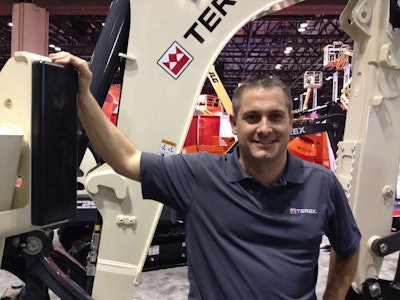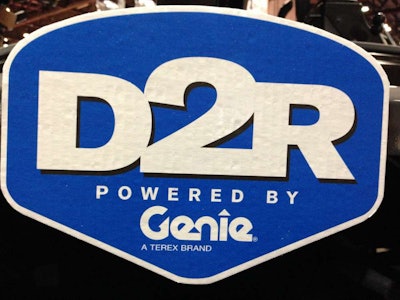 Terex VP Dean Barley: “Things made sense with the trucks and we took the opportunity.”
Terex VP Dean Barley: “Things made sense with the trucks and we took the opportunity.”While at The Rental Show last week, we sat down with Dean Barley, vice president and general manager of Terex Construction Americas, to discuss the Terex construction segment following the sale of its rigid-frame and artic haulers to Volvo in December.
“We’ve been struggling as a division for the past five years,” said Barley, “but now we’re poised in 2014 for a great year.” One reason: the growth of rental, which now represents between 30 to 35 percent of the construction segment’s business.
But back to the truck sale, which Barley admits generated a lot of questions. Trucks coming out of Terex’s plant in Motherwell, Scotland, have been a staple of the Terex brand for more than 30 years. There, Terex manufactured five rigid-frame models, the 31.8-metric-ton TR35 on up to the 91-metric-ton TR100, and three articulated trucks. But the trucks were no longer a fit with Terex’s emerging emphasis on compact equipment.
“Back in 2004, we had a private label agreement with Daewoo (now Doosan) for excavators and large wheel loaders,” explains Barley. “Things would be different if that had worked out.” With no loading product to match the size of the trucks it produced, the trucks became orphans when the company’s focus turned to smaller equipment, including backhoes, compact track loaders and compact excavators.
When talks began with Volvo, the initial focus was not the truck sale but on using the Volvo rental channel, which Volvo has since sold. “But things made sense with the trucks and we took the opportunity,” Barley said. As is usual in such sales, Volvo can keep the Terex name on the trucks for up to five years. “Volvo has the product line to give the trucks another chance,” Barley says.
 Direct 2 Rental (D2R) is a new initiative by Terex division Genie to offer rental customer sales and service support for specific machines.
Direct 2 Rental (D2R) is a new initiative by Terex division Genie to offer rental customer sales and service support for specific machines.The past year involved restructuring for the Terex division, returning the Terex Mixer truck line to the market, and repositioning its Oklahoma City former roadbuilding plant, where the Fayat Group (Bomag) leases manufacturing space to produce the asphalt pavers, reclaimer stabilizers and material transfer products it bought from Terex.
“We’re now intent on focusing on a few things well, as opposed to trying to be everything to everybody,” Barley says, a contrast to the brand’s former acquisition-heavy days. During 2013, Terex announced private label agreements to build compact track loaders for Vermeer, and compact skid steers for Takeuchi. “We’ve rebounded quite well in North America, and are getting close to selling 2,000 more units than we did in 2010,” he says.
During ARA, Terex brand Genie announced it would sell, service and provide parts and warranty support for select Terex Construction and Terex Crane products in a Direct 2 Rental program, which initially includes the Terex TLB840 backhoe, and BT3870 and BT 4792 boom trucks. “This leverages Genie’s relationships with small accounts, and gives us another way to sell directly into the rental channel,” Barley says.







